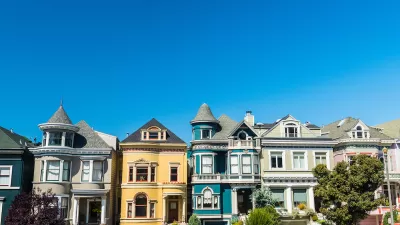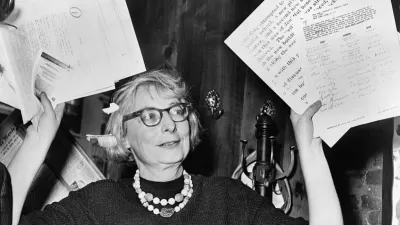The iconic urban thinker has influenced generations of planners, but how do her ideas hold up in an age of massive upheaval and economic inequality?

Writing in Urban Omnibus, Jennifer Hock, Nathan Storring, and Samuel Zipp take stock of the legacy of the so-called "patron saint of city planners," that powerful voice for neighborhood-level urbanism, Jane Jacobs.
While Jacobs' observations on the qualities of vibrant neighborhoods once served as the paragon of urbanist ideals, recently some critics have argued that her ideas are "a relic" that has been "rendered useless in a time of huge-scale urban and global problems." The building blocks she wrote about have become codified "lifestyle amenities for real estate boosterism, instruments of accumulation in the quivers of urban developers" that are created and manipulated to sell high-priced properties to those who can afford them. Whereas Jacobs relentlessly believed in the power of cities as "decentralized, dynamic, always unpredictable human system[s]," activists today argue that too many aspects of "good" urbanism have been captured by "the forces of neoliberalism."
Her failure to address the role of race in urban politics and policies remains a glaring blind spot in her work, but Hock argues that her ideas remain relevant in helping readers understand how to observe and appreciate their city. "We need to bring Jacobs into the 21st century by placing her in dialogue with writers who have thought deeply about the ways in which racism is implicated in the 'sidewalk ballet.'" Saint Jane's ideas may, in some instances, be outdated or myopic, but her clear-eyed observations of city life and emphasis on small-scale decision making and civic duty continue to offer valuable lessons for today's urbanists.
FULL STORY: What About Jane?

Planetizen Federal Action Tracker
A weekly monitor of how Trump’s orders and actions are impacting planners and planning in America.

Maui's Vacation Rental Debate Turns Ugly
Verbal attacks, misinformation campaigns and fistfights plague a high-stakes debate to convert thousands of vacation rentals into long-term housing.

San Francisco Suspends Traffic Calming Amidst Record Deaths
Citing “a challenging fiscal landscape,” the city will cease the program on the heels of 42 traffic deaths, including 24 pedestrians.

Defunct Pittsburgh Power Plant to Become Residential Tower
A decommissioned steam heat plant will be redeveloped into almost 100 affordable housing units.

Trump Prompts Restructuring of Transportation Research Board in “Unprecedented Overreach”
The TRB has eliminated more than half of its committees including those focused on climate, equity, and cities.

Amtrak Rolls Out New Orleans to Alabama “Mardi Gras” Train
The new service will operate morning and evening departures between Mobile and New Orleans.
Urban Design for Planners 1: Software Tools
This six-course series explores essential urban design concepts using open source software and equips planners with the tools they need to participate fully in the urban design process.
Planning for Universal Design
Learn the tools for implementing Universal Design in planning regulations.
Heyer Gruel & Associates PA
JM Goldson LLC
Custer County Colorado
City of Camden Redevelopment Agency
City of Astoria
Transportation Research & Education Center (TREC) at Portland State University
Jefferson Parish Government
Camden Redevelopment Agency
City of Claremont




























